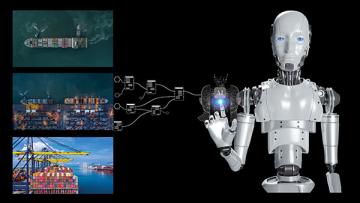The U.S. Department of Transportation Maritime Administration (MARAD) has opened applications for the Port Infrastructure Development Program (PIDP). More than $6.6 million in grant funding is available for projects that include environmental and emissions mitigation measures and terminal equipment upgrades.
Heavy-duty diesel equipment in ports, such as forklifts and yard tractors, are a leading cause of air pollution within nearby communities. With this funding, ports can begin replacing their diesel and gasoline-powered equipment with clean energy alternatives such as propane-powered port tractors, forklifts, and other cargo handling equipment (CHE). In fact, best-in-class propane forklift engines produce 97% fewer hydrocarbon and nitrogen oxide (NOx) emissions when compared with similarly sized diesel forklifts without any drop-off in payload or power.
“This funding brings the opportunity for ports to take immediate steps toward decarbonization,” said Propane Education & Research Council’s (PERC) director of off-road business development Joe Calhoun. “Propane is a clean, powerful, dependable energy option available right now that can improve quality of life in surrounding port communities.”
Along with CHE upgrades, propane-powered charging infrastructure, such as mobile charging pods and anti-idling shore power technologies, are also eligible for funding. This is a cost-effective and low-emissions strategy to provide immediate clean energy power for CHE and other mobile equipment. Because propane is affordable, ports can more quickly implement clean solutions to accelerate emissions reductions.
Propane-powered microgrid projects are also eligible for PIDP grant funding. Microgrids are local, isolated and independent electric grids that can be either grid connected or disconnected. The microgrids produce power with a combination of propane generation equipment and renewable sources like wind and solar. By combining ultra-low emissions propane with renewable energy sources, ports are able to significantly reduce emissions.
Beyond emissions reductions, propane-powered microgrids provide autonomy and resilience that keeps the lights on, assures equipment is charged and assists with making sure containers stay moving in the ports — even when the grid fails.
Qualified projects can be located within the port, outside a port boundary and directly related to port operations, or as an intermodal port connection. Grant applications must be submitted through Grants.gov by 11:59 p.m. EST on April 28, 2023. For grant writing support, reach out to PERC here.
There are many ways propane can help ports improve efficiency and reduce their carbon footprints. To learn more, visit here.
SC
MR

More Sustainability
- Uber Freight’s Val Marchevsky to deliver Keynote at NextGen Supply Chain Conference
- Unlocking the green grid: Innovations for eco-friendly last mile
- Last call for speaker abstracts, award submissions for NextGen Supply Chain Conference
- The paradox of carbon reduction spending in corporate supply chains
- FSMA Rule 204: Why digital traceability can’t wait
- Services sector growth continues in April, reports ISM
- More Sustainability
Latest Resources

 Explore
Explore
Topics
Business Management News
- C.H. Robinson rolls out AI agent to address LTL classification overhaul
- Danone latest to announce new US investment
- From flight decks to fulfillment: A veteran’s supply chain journey
- Employee versus enterprise AI adoption
- Uber Freight’s Val Marchevsky to deliver Keynote at NextGen Supply Chain Conference
- Unlocking the green grid: Innovations for eco-friendly last mile
- More Business Management
Latest Business Management Resources

Subscribe

Supply Chain Management Review delivers the best industry content.

Editors’ Picks




